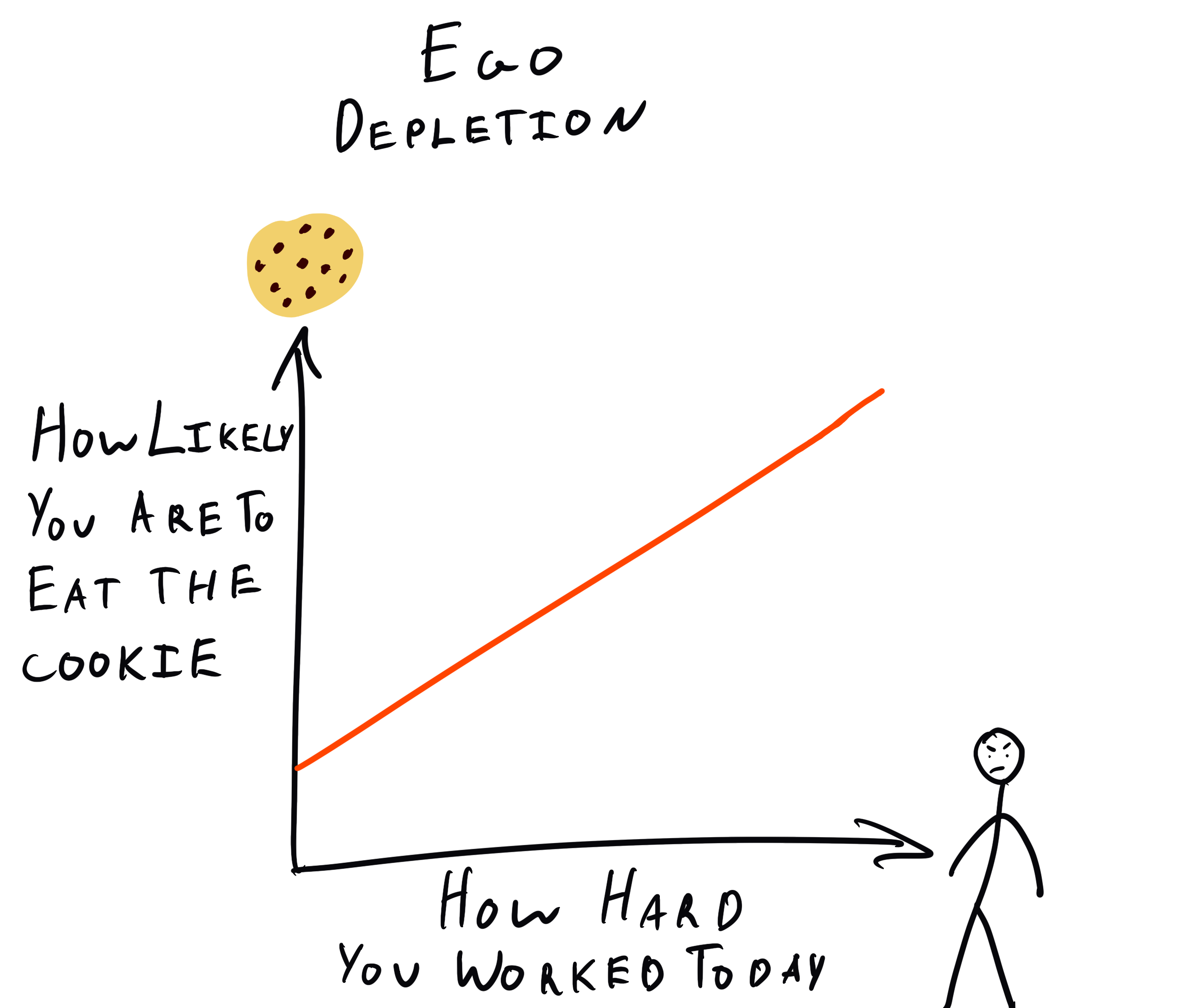Ego Depletion

The Basic Idea
There’s no denying Sigmund Freud’s significant impact on the field of psychology. While some of his better known and more controversial theories have fallen out of favor since his death in 1939, much of his work has been hugely influential to modern psychology. One Freudian concept – that of the ego – inspired the modern psychological notion of ego depletion. Ego depletion claims that there are three constantly interacting aspects to our personality. The first is the id, which encompasses our most primal urges and is driven by the search for pleasure. Next is the superego, which is concerned with morality and the sense of right and wrong taught to us by our families and society. Finally, there is the ego, which is tasked with mediating the conflicting interests of the id and the superego, so that the id can be satisfied without overstepping the moral boundaries of the superego.1
According to Freud’s theory of personality, the ego is constantly working to keep the id in check. Like any other cognitive task, the ego’s constant efforts to satisfy both the id and the superego requires mental energy, which is limited. Self-control can be thought of like a muscle; when it is well rested, it is strong, however, as it is worked, it becomes fatigued and needs to be rested again. Just like how a muscle becomes less effective as it is worked, the ego’s ability to exert self-control depletes and requires rest before it can work again.2
When we experience ego depletion, we do not have the mental energy to make effortful decisions or keep ourselves from engaging in temptations. As a result, we may make poor choices and lose productivity.
Unlike cognitive load, ego depletion is at least in part a loss of motivation. After exerting self-control in one task, you do not feel like making an effort in another, although you could do it if you really had to.
– Daniel Kahneman
Theory, meet practice
TDL is an applied research consultancy. In our work, we leverage the insights of diverse fields—from psychology and economics to machine learning and behavioral data science—to sculpt targeted solutions to nuanced problems.
Key terms
Id
According to Freud, the id is the first part of our personality to develop and consists of our most basic primal and instinctive urges. It resides in the unconscious mind, meaning that we cannot access it. The id is motivated by a need for pleasure and satisfaction and demands for these needs to be fulfilled immediately, regardless of consequences. If these needs are not fulfilled, we become stressed and anxious.6
Superego
While the id is driven by the pleasure principle, the superego is driven by the morality principle. The superego contains the conscience, our internalized sense of right and wrong, which we learn as children from the adult figures in our lives. It encompasses the morals and ideals that are ingrained in us by society from a young age.7 The superego is often in conflict with the id, as the id may desire to completely disregard social norms and moral values in order to satisfy its needs, leading us to experience anxiety.
Ego
The Freudian theory of personality suggests the purpose of the ego is to enable compromise between the id and the superego, such that the id’s desires are satisfied in a way that is considered acceptable to society. Both the id and the superego are unrealistic in their demands, thus the ego aims to find a reasonable middle ground. Freud referred to the ability of the ego to act as a mediator for these two opposing forces as “ego strength.”8 Like a muscle, ego strength is depleted as it is used. When this mental energy runs low, we are no longer able to keep the id in check, which results in the poor decisions and impaired performance associated with ego depletion.
Delay of gratification
Delay of gratification refers to the ability to forego an immediate reward in order to obtain a larger reward later on.9 For example, someone aiming to quit smoking in order to improve their health will need to resist the temptation of a cigarette in order to meet their long term goal. When we experience ego depletion, it becomes harder to delay gratification and turn down immediate reward, even though we know that doing so will benefit us in the long run.
History
The concept of ego depletion can be traced back to Freud’s theory of personality, which suggested that our personalities are composed of the id, ego, and the superego, and that each of these components makes its own unique contribution to who we are and how we act. This theory was first introduced in the early 1920’s.10 Although Freud was not the one to propose the term “ego depletion,” he certainly laid the foundation for it.
It was several decades after Freud first introduced his theory of personality that the term “ego depletion” was used. In 1998, psychologist Roy Baumeister and his colleagues published a paper titled “Ego depletion: Is the active self a limited resource?”. In their famous study, Baumeister and his colleagues offered participants a chocolate chip cookie before asking them to complete a challenging puzzle task. They demonstrated that those who refused the cookie gave up on the puzzle much more quickly than those who accepted it. Baumesiter and his colleagues chalk this up to ego depletion, stating that refusing the cookie took willpower, thereby drawing from the participants’ limited pool of mental energy. The researchers also provided evidence that this effect is not context specific, by asking participants to give a presentation that included opinions that either opposed or aligned with their true beliefs. Those who gave a presentation that included views they did not believe in gave up on the subsequent puzzle task more quickly than did those who gave a presentation that aligned with their true beliefs. This is because it requires more mental energy to defend an opinion you do not believe in than it does to defend a view you yourself hold.11
People
Sigmund Freud
Sigmund Freud is a controversial psychologist, who lived from 1856 to 1939.14 His theory of personality introduced the id, ego, and superego, which in turn gave rise to the theory of ego depletion. Freud is also famous for his controversial theory of personality development, which suggests that children pass through several stages of psychosexual development and that successfully resolving the conflicts that come with each stage enables them to become mentally healthy adults. Furthermore, he is known for his contribution to the creation of psychoanalysis, a form of psychotherapy that has been greatly influential to some approaches of modern therapy.
Roy Baumeister
Freud’s notion of ego depletion was built upon and refined by Roy Baumeister, a renowned social psychologist. Baumeister is best known for his contributions to the literature on self-control and self-esteem. He focused much of his research on their associations with morality and success. Baumeister is currently a professor of Psychology at the University of Queensland, where he lectures on the topic of willpower.15
Consequences
Depleted willpower can impair our performance by making us more inclined to engage in impulsive behaviors. It can make people more willing to drink alcohol, which can have serious consequences for anyone struggling with substance abuse, as well as interfere with people’s attempts to quit smoking by making it significantly harder to say no. Ego depletion may also decrease our productivity, as we will not have the willpower to choose productive tasks over enjoyable activities.4
Luckily, ego depletion can be avoided. Stress and fatigue contribute to ego depletion so taking care of our mental wellbeing by ensuring that we get enough sleep and engage in activities that reduce our stress plays a key role in preventing it. Furthermore, when we experience ego depletion, focusing on our goals instead of our feelings in the moment may be a helpful means of motivating ourselves to delay gratification.5 We have to make many decisions each day, some of great importance. It is necessary to understand the factors that may influence these decisions, in order to make the best ones.
Additionally, the concept of ego depletion inspired the development of a cognitive bias known as decision fatigue. Decision fatigue is a form of ego depletion which refers to our tendency to make worse decisions when overwhelmed by many choices. The more decisions we make, the more mental energy we use and the more our cognitive abilities tire.
Controversies
The concept of ego depletion is not universally accepted. Some argue that its effects are overstated, while others claim it does not exist at all. It recently came under fire when an attempt to replicate Baumeister’s landmark study did not yield results in support of ego depletion.16
Furthermore, a study conducted by Stanford researcher Carol Dweck demonstrated that signs of ego depletion were only observed in participants who thought of willpower as a limited resource, suggesting that ego depletion is the result of a placebo effect. Researchers are concerned that, should Dweck’s conclusions be true, propagation of the theory of ego depletion might be doing real harm by keeping people from achieving their goals or leading them to make poor decisions.17 Michael Inzlicht of the University of Toronto suggests that willpower is not a finite resource, but more akin to something like an emotion. Just like we cannot “run out” of anger or happiness, we cannot run out of willpower. He argues that when we are unmotivated or seemingly running low on willpower, it is a sign that the task at hand is not engaging us. This is why we may find ourselves constantly checking Instagram while we are doing a dry textbook reading, but find ourselves spending hours completely immersed in the newest novel by our favorite author.18 Baumeister responded to these arguments against the theory of ego depletion the best way a researcher can – by stating that he and his colleagues will continue to conduct studies on the matter in order to try to demonstrate that the concept does in fact exist.
Case Studies
The role of physiology
Recently, psychologists have been conducting research to uncover the physiological mechanisms that underlie ego depletion. “Running on Empty: Neural Signals for Self-Control Failure”, a 2007 paper by Michael Inzlicht and Jennifer N. Gutsell, demonstrated that when individuals experience ego depletion, they exhibit weaker error-related negativity signals, waveforms which can be recorded using an electroencephalogram, which is a common methodology used for detecting electrical activity in the brain.12 Other research has suggested that people with greater heart rate variability, which refers to the variation in time between heartbeats, exhibit less self-control compared to those with less heart rate variability.13 Research in this area is still relatively new and more work needs to be done in order to establish the relationship between physiological factors and self-control.
Poor shopping decisions
Studies have shown that shoppers tend to make poor decisions when they experience ego depletion. They may impulsively buy expensive items, simply because they recognize the brand name, or simply buy the cheapest item available, in order to avoid having to weigh the pros and cons of the various options available to them.3 While this enables them to complete the task quickly and without pulling very much from their already depleted pool of mental resources, it may not always lead to the best consumer decisions. Afterwards, shoppers may find themselves unsatisfied with their purchases and wishing they had chosen differently.
Related TDL Content
Ego depletion is closely linked to the concept of decision fatigue, a cognitive bias that can seriously impair our ability to make adaptive decisions. Freud’s theory of ego depletion inspired the initial models of decision fatigue, which suggest that our mental energy is finite and depletes with use.
Sources
- Cherry, K. (2019). Freud’s Id, Ego, and Superego. VeryWellMind. https://www.verywellmind.com/the-id-ego-and-superego-2795951
- Ego Depletion. BehavioralEconomics.com. https://www.behavioraleconomics.com/resources/mini-encyclopedia-of-be/ego-depletion/
- Cherry, K. (2020). How Ego Depletion Can Drain Your Willpower. VeryWellMind. https://www.verywellmind.com/ego-depletion-4175496
- See 3
- See 3
- See 1
- See 1
- See 1
- Conti, R. (2019). Delay of gratification. Encyclopaedia Britannica. https://www.britannica.com/science/delay-of-gratification
- McLeod, S. (2019). Id Ego Superego. Simply Psychology. https://www.simplypsychology.org/psyche.html
- Baumeister, R. F.; Bratslavsky, E.; Muraven, M.; Tice, D. M. (1998). “Ego depletion: Is the active self a limited resource?” (PDF). Journal of Personality and Social Psychology. 74 (5): 1252–1265. doi:10.1037/0022-3514.74.5.1252
- Inzlicht, M and Gutsell, J.N. (2007). “Running on Empty: Neural Signals for Self-Control Failure”. Psychological Science, 18(11). https://doi-org.proxy3.library.mcgill.ca/10.1111/j.1467-9280.2007.02004.x
- See 3
- Jay, M.E. (2020) Sigmund Freud. Encyclopaedia Britannica. https://www.britannica.com/biography/Sigmund-Freud
- Professor Roy F. Baumeister. RoyBaumeister.com. https://roybaumeister.com
- Eyal, N. (2016). Have We Been Thinking About Willpower The Wrong Way For 30 Years? Harvard Business Review. https://hbr.org/2016/11/have-we-been-thinking-about-willpower-the-wrong-way-for-30-years
- See 16
- See 16


